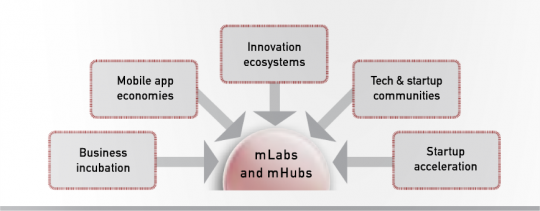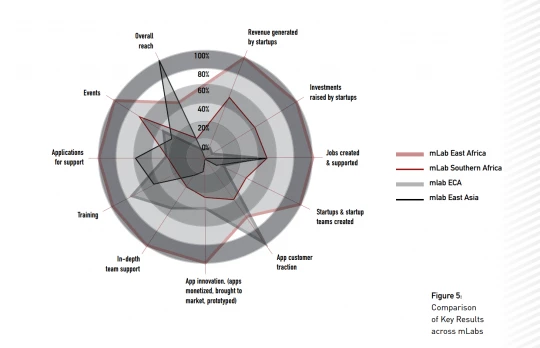
“The technology startup scene has grown from zero to hundred in the last three years”, a Mobile Monday co-founder in Bangkok recently told us. Amazingly, the same statement could have been made in Bogota, Kampala, Kingston or Tbilisi (Check out a collection of videos that tell the stories of these mobile startups). Fueled by better and better ICT and mobile Internet infrastructure as well as lower barriers to entry, tech entrepreneurship is on the rise globally, and the World Bank and others are increasingly looking to leverage the trend to foster sustained economic and social development.
In the U.S. and Europe, startup accelerators have been the flavor of the day, whereas in Africa, Asia, and other emerging markets, entrepreneurial buzz was driven more by the rise of tech hubs. For those new to the topic: Tech hubs connect stakeholder groups, leverage resources, and fill gaps in innovation ecosystems, all for the ultimate benefit of grassroots, early-stage entrepreneurs who develop technological solutions like mobile applications.
There is no cookie cutter approach to building a tech hub. Having been involved with several entrepreneurial communities around the world, we can say that tech hubs come in different shapes and sizes, depending on the available people and resources and on the needs of the ecosystem.
Implementation models range from regular meet-ups to co-working spaces with tiered membership, as well as sector-specific startup enablers such as infoDev’s network of mLabs and mHubs. As is the case for startups supported by the hubs, building a well-oiled machine with a business model that can run on its own takes vision and courage from tech hub leadership, while testing hypotheses to learn and iterate is crucial.
At the same time, infoDev’s stakeholders are asking us to provide them with general insights into the sustainability as well as the results and outcomes of tech hubs—both foundations of their long-term legacy, as Tim Kelly pointed out in his recent blog post. Networks such as AfriLabs are important vehicles to ensure learning among peers, but most have no time and resources to codify lessons that could help the global community move from pilot projects towards scaling tech hubs into larger support programs.
To address the knowledge gaps and learn for our own future programming, we took a focused effort to identify the lessons from our global mLab and mHub pilot program, which covered a dozen tech hub initiatives since 2010, covering Africa, Asia, and ECA (Europe and Central Asia).
One of the outcomes of the evaluation efforts is the report ‘The Business Models of mLabs and mHubs— An Evaluation of infoDev’s Mobile Innovation Support Pilots’. We used case studies of mLab and mHub business models (illustrated through the Business Model Canvas), a comparative results mapping, and inputs from over 200 stakeholders to develop a detailed and in-depth analysis that our stakeholders can benefit from.
The result was almost 140 pages of honest insights—which we believe are useful not only for tech hub leaders, but also for partners such as technology companies, donors, and government agencies that support technology entrepreneurship. Below are a few key findings from the report:
- mLabs and mHubs can implement a variety of business models, and experimentation and adaptation will remain necessary. In particular mLabs’ revenue and financial sustainability models require further testing and adjustment.
- Startups and entrepreneurs are usually open to paying for services or sharing success with mLabs, but they expect a high-value service and are uncertain about the appropriate procedure for far-reaching contractual agreements.
- Startups see one-on-one mentoring as the key value proposition of mLabs, and they request that it be given stronger emphasis.
- Innovation competitions lead to better results for startup creation if they are embedded in continuous support, including follow-up mentoring and contact brokering with potential partners and investors.
- mLab managers are aware that selection of incubatees and tracking them after they leave the program is crucial, but they have sometimes fallen short of doing this adequately.
- mLabs have struggled to achieve a strong regional footprint beyond their base country and city. Consortia that are led by government-linked entities or universities often suffer from bureaucratic requirements that can conflict with the mission and mode of operation required for an effective mLab
As infoDev continues to support tech startup communities around the world, we are committed to keep knowledge creation as a key component of our efforts. Please let us know your thoughts on our report - and share your ideas on how we can develop effective, sustainable tech hubs around the globe.




Join the Conversation